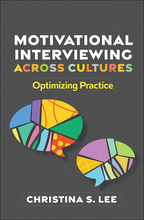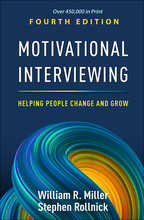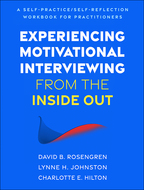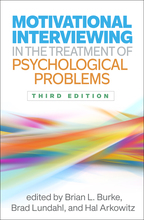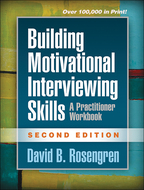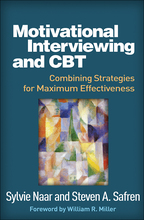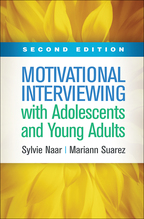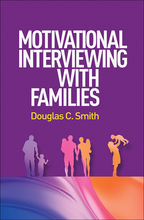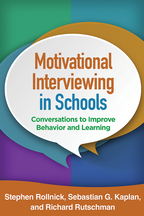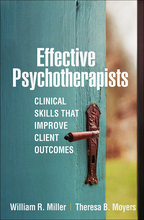Motivational Interviewing across Cultures
Optimizing Practice
Christina S. Lee
HardcoverPaperbacke-bookprint + e-book
Hardcover
orderMarch 18, 2025
ISBN 9781462555864
Price: $53.00 170 Pages
Size: 6" x 9"
Paperback
orderNovember 20, 2024
ISBN 9781462555857
Price: $35.00170 Pages
Size: 6" x 9"
e-book
orderNovember 7, 2024
PDF and Accessible ePub ?
Price: $35.00 170 Pages
ePub is Global Certified Accessible
print + e-book $70.00 $42.00
orderPaperback + e-Book (PDF and Accessible ePub) ?
Price: 170 Pages
ePub is Global Certified Accessible
Sign up for emails on upcoming titles on Motivational Approaches (with special discounts)!
“I have been waiting for a book like this! For too long, researchers and clinicians have been left to make cultural adaptations on their own. This book guides cultural adaptation with specific examples and theoretical guidance, while avoiding stereotypes. Lee writes in a pragmatic, conversational tone, tying together foundational humanistic writings and recent research to optimize MI for use with diverse and marginalized people. She shares ways to deeply affirm people’s identities to empower them to contemplate their unhealthy behaviors, which facilitates hope and positive change. This book should be required reading in health care and counseling.”

—Kamilla L. Venner, PhD, Ahtna Athbascan Tribal member; Department of Psychology and Center on Alcohol, Substance use, And Addictions, University of New Mexico
“An amazing resource for clinicians, supervisors, students, and others working to address the needs of diverse individuals, couples, and families. Culturally adapted MI prioritizes what matters to clients, taking into consideration the whole person. Lee’s expertise is present in every chapter as she draws from cutting-edge cultural theories and models and provides case examples that illustrate the power of her approach. This groundbreaking work will doubtless be invaluable for both graduate students and experienced clinicians.”

—Lisa A. Suzuki, PhD, Department of Applied Psychology, Steinhardt School of Culture, Education, and Human Development, New York University
“As a clinician and educator, I highly recommend this book for its exceptional approach to implementing MI in ways that can best serve clients from diverse cultural backgrounds. Lee offers clear, practical guidance, with definitions, case examples, and sample dialogues that make her approach immediately accessible to practitioners at any level. I particularly appreciate the book’s strong emphasis on cultural humility, client autonomy, and person-centered care. It challenges readers to reflect on their own biases while enhancing their cultural awareness, ultimately improving MI’s impact in practice. Lee provides a much-needed framework for creating therapeutic environments where clients from diverse backgrounds feel truly seen, heard, and supported in making meaningful changes to improve their quality of life. A 'must read'!”

—Tamika C. B. Zapolski, PhD, Department of Psychiatry, Indiana University School of Medicine
“Lee clearly points out ways to enhance MI for individuals from a wide range of sociocultural backgrounds. This is a valuable contribution not just for those who apply MI, but also for practitioners interested in integrating a sociocultural perspective into therapy more generally.”

—Steven R. Lopez, PhD, Department of Psychology, University of Southern California
“Lee brings her considerable clinical and research experiences to life in this book, providing communication tools and case examples from counseling and medical settings. Practitioners and graduate students will find this book useful as a companion to other MI resources or as a stand-alone guide. It could be used as a text in counseling, multicultural practice, health communication, and substance use treatment courses. Lee addresses and gives examples of anti-racist practice, practitioner self-reflection, client experiences of stigma and discrimination, and how to optimize the use of MI skills, such as affirmations. Her focus is seeing the client as a whole person in their cultural context—not just their presenting concerns.”

—Melinda Hohman, PhD, MSW, School of Social Work (Emeritus), San Diego State University
—Kamilla L. Venner, PhD, Ahtna Athbascan Tribal member; Department of Psychology and Center on Alcohol, Substance use, And Addictions, University of New Mexico
“An amazing resource for clinicians, supervisors, students, and others working to address the needs of diverse individuals, couples, and families. Culturally adapted MI prioritizes what matters to clients, taking into consideration the whole person. Lee’s expertise is present in every chapter as she draws from cutting-edge cultural theories and models and provides case examples that illustrate the power of her approach. This groundbreaking work will doubtless be invaluable for both graduate students and experienced clinicians.”
—Lisa A. Suzuki, PhD, Department of Applied Psychology, Steinhardt School of Culture, Education, and Human Development, New York University
“As a clinician and educator, I highly recommend this book for its exceptional approach to implementing MI in ways that can best serve clients from diverse cultural backgrounds. Lee offers clear, practical guidance, with definitions, case examples, and sample dialogues that make her approach immediately accessible to practitioners at any level. I particularly appreciate the book’s strong emphasis on cultural humility, client autonomy, and person-centered care. It challenges readers to reflect on their own biases while enhancing their cultural awareness, ultimately improving MI’s impact in practice. Lee provides a much-needed framework for creating therapeutic environments where clients from diverse backgrounds feel truly seen, heard, and supported in making meaningful changes to improve their quality of life. A 'must read'!”
—Tamika C. B. Zapolski, PhD, Department of Psychiatry, Indiana University School of Medicine
“Lee clearly points out ways to enhance MI for individuals from a wide range of sociocultural backgrounds. This is a valuable contribution not just for those who apply MI, but also for practitioners interested in integrating a sociocultural perspective into therapy more generally.”
—Steven R. Lopez, PhD, Department of Psychology, University of Southern California
“Lee brings her considerable clinical and research experiences to life in this book, providing communication tools and case examples from counseling and medical settings. Practitioners and graduate students will find this book useful as a companion to other MI resources or as a stand-alone guide. It could be used as a text in counseling, multicultural practice, health communication, and substance use treatment courses. Lee addresses and gives examples of anti-racist practice, practitioner self-reflection, client experiences of stigma and discrimination, and how to optimize the use of MI skills, such as affirmations. Her focus is seeing the client as a whole person in their cultural context—not just their presenting concerns.”
—Melinda Hohman, PhD, MSW, School of Social Work (Emeritus), San Diego State University

